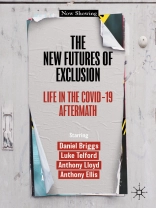Based upon global data and following on from
Lockdown: Social Harm in the COVID-19 Era, this book discusses the rise of surveillance capitalism and new forms of control and exclusion throughout the Covid-19 pandemic. It particularly addresses the use of vaccine passports, mandates and the new forms of capital extraction and political control that emerged throughout the pandemic. The book also explicates how the ‘vaccine hesitant’ became marginalized in both mainstream discourse and through regulatory interventions. Whilst the book addresses the wider political economy within which so-called ‘anti-vaxxers’ were ostracized, it also explores the complex nature of their sentiments. The book closes by considering
The New Futures of Exclusion, outlining the forms of surveillance and control that may be implemented in the future particularly in light of the challenges brought by global warming and the energy transition. It is a broadly accessible text, particularly appealing to policymakers, general readers and academics in sociology, political sociology, politics, human geography, political economy, criminology, social policy, psychology, history, and infectious diseases and medicine.
Зміст
Introduction: The story so far.- 1 Freedom withdrawals and the trade-off for compliance.- 2
Harmalogical pharmacology and the Covid-19 vaccine.- 3 Technocratic feudalism and the new surveillance governance.- 4 Digital apartheids and the ‘Other’.- 5 Asymptomatic freedom, resistance and the ‘anti-vaxxers’.- 6 Heavy hands and iron fists against high social fevers.- 7 The new futures of exclusion.
Про автора
Daniel Briggs is Professor of Criminology at Northumbria University, UK.
Luke Telford is Lecturer in Criminal Justice & Social Policy at the University of York, UK.
Anthony Lloyd is Associate Professor in Criminology and Sociology at Teesside University, UK.
Anthony Ellis is Associate Professor in Criminology at the University of Lincoln, UK.












